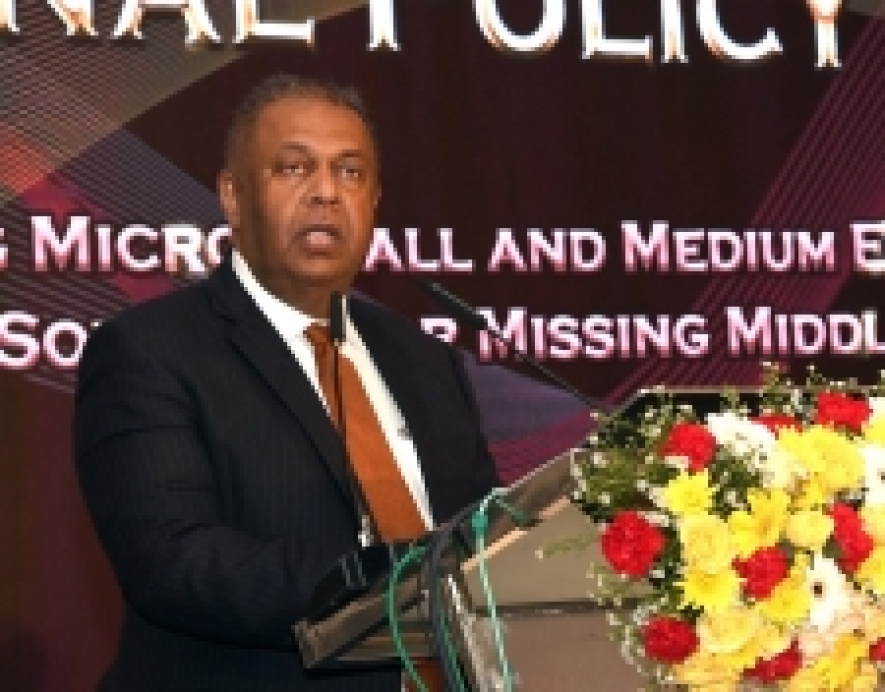Addressing the Asia-Pacific Rural and Agricultural Credit Association at Hilton Colombo the minister further said that in most surveys done around the world, access to finance is a striking obstacle faced by SMEs, and this is no different in Sri Lanka and the rest of our region. With regard to SMEs, the Sri Lankan government’s intention is to integrate SMEs into the formal sector and also to establish hard and soft infrastructure frameworks to facilitate their growth.
Text of the mini8ster’s speech as follows:
Let me at the outset thank you for inviting me to address this important regional gathering today.Globally, SMEs represent a significant component of all enterprises. In Sri Lanka, the majority of companies are of the SME category and contributes the bulk of employment as well.
Every country in the world has identified the importance of SMEs in their economies as a practical instrument in achieving sustainable economic growth. Nevertheless, they persistently face difficulties in setting-up and running businesses. In fact, in most surveys done around the world, access to finance is a striking obstacle faced by SMEs, and this is no different in Sri Lanka and the rest of our region.
With regard to SMEs, the Sri Lankan government’s intention is to integrate SMEs into the formal sector and also to establish hard and soft infrastructure frameworks to facilitate their growth. Measures are being taken to improve access to credit, access to markets, and encourage integration of value chains connecting SMEs and large firms. We will encourage project-based lending rather than collateral based lending, rationalize upfront taxes that hinder expansion, and encourage knowledge sharing between R & D institutions and SMEs.
Towards this end, as part of Vision 2025 policy document, our government has identified the importance of the SME sector and initiated the ‘Enterprise Sri Lanka’ scheme to address some of these obstacles and minimise the SME finance gap in Sri Lanka.Some of the issues targeted by this programme would be to make market interest rates more affordable by subsidising interest payments and addressing the pervasive issue of, lack of collateral.
Youth unemployment is addressed partly by enabling young graduate’s to start-up companies, through access to interest free loans.There are several subsidised loans for the agricultural sector, at various points of the value chain, in an effort to improve productivity and value addition in that sector.
Other targeted investments are - technology, funded through Enterprise Sri Lanka, which would enable SMEs to be more competitive in their industries.Inclusivity is a priority in this programme. The scheme promotes inclusivity of, often disadvantaged groups of society. For example; preferential interest rates are given for enterprises headed by women and those who are differently abled.
Furthermore, through specific incentives provided, Enterprise Sri Lanka promotes investments in good business practices. Investments in solar power for SMEs signify a transfer to a reliable and sustainable source of power for SMEs. Concessionary loans are provided to invest in public transport to ease road congestion and reduce negative externalities.
I am pleased to note that up to now, nearly 20,000 have applied to the participating banks for these loans since its inception and the government anticipates further growth in these figures.Through these schemes and associated multiplier effects, the government expects that one million new jobs will be added to the economy.
As much as access to finance is promoted through government programmes, I believe the government also should focus on encouraging responsible lending practices. The proliferation of unethical lending in microfinance, in particular, led to a crisis situation in some parts of the country. To address this, the government of Sri Lanka has written-off micro-finance debts of more than 45,000 women that amounted to more than Rs. 1.25 Billion.
It is essential that steps are taken to prevent such irresponsible lending recurring in the future. Towards this end, the government is drafting new measures for the microfinance sector, stipulating industry standards in protecting borrowers from exorbitant and unnecessary charges and other malpractices commonly seen in the industry.Drawing from the experiences of APRACA member countries, this forum provides an excellent opportunity for knowledge sharing.
The coverage of the forum addresses many issues directly relevant to Sri Lanka’s goals such as stock taking of the current state of affairs in financing SME’s, the role of SME’s as a driver to enhance efficiency of entrepreneurship, supporting the development of value chains, among others. I thank APRACA for its decision to hold this forum in Sri Lanka and the Bank of Ceylon for hosting it this year. I wish APRACA all success and I wish delegates from other countries an enjoyable stay in Sri Lanka.
.




















